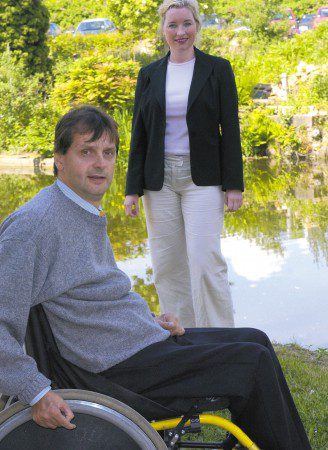
Starting your own business: Peter Henry of ORIGIN
Peter Henry writes this great article following on from reading about the business ambitions of a man with a spinal injury. Henry explains why he is delighted to report that he is not alone in pursuing business goals with a disability.
I left hospital in 1987 following 7 months in Stoke Mandeville Hospital after a C5/6 injury. Over the following months, it became apparent that I would need, and wanted, something to do for the rest of my working life. I wasn’t interested in going back to my old job selling computers and it also became apparent that it would be easier to start a business rather than trying to convince someone else to give me a job.
At this time I was also struggling to find carers/PA’s. This led my father to observe that ‘if we were struggling to find carers, the chances are other people are too’. He was right. Ultimately, these factors combined when I co-founded the first specialist spinal injury care agency in the UK in 1991/1992. My business degree directly contributed to the development of this company until 2000, when I sold my interests to concentrate on a new project.
This project was, and is, ORIGIN. ORIGIN was started in 2001 to focus on providing the very highest standards of live-in homecare exclusively for people with a spinal injury, as opposed to the more general model of ‘people with complex conditions’. My business partner also has experience of live-in spinal injury care and this direct personal experience, by both principals, is the foundation of the expertise our team brings to clients.
The raison d’etre of ORIGIN is to bring high quality live-in care to provide clients with the practical help that will allow them to live as independently as possible with a high level spinal injury. Our clients have grabbed this opportunity with both hands and live their lives in infinitely varying ways – some study, some work, some have families, many travel, still others lead quieter lives and our services and PAs adapt to however our clients choose to live.
We are delighted that ORIGIN last year celebrated 10 years in business. Over that 10 year period, the company has developed very significantly and expanded to include the provision of specially adapted holiday accommodation in the South of France and an increasing range of short term and respite options that give greater flexibility of care.
As directors of our own business, we have endless challenges from every direction but that’s business and these very challenges, the development process and the discipline of going to work every day are – I find – great contributors to living a full and interesting life.
There are challenges for people with a spinal injury when starting/running their own business, but then most facets of life in general are affected by a spinal injury and the same is true for work and running a business. Typical issues include:
• Time – the sheer time it takes to carry out one’s normal routines has to be factored in to the working day. My routines are, thankfully, relatively straightforward and I have refined them vastly to make my use of time as efficient as possible. If things run late or go wrong, inevitably there are consequences such as delayed or cancelled activities.
• Simply having a spinal injury/PAs – working with PAs at home is, of itself, quite demanding. Anyone disabled will experience the frustrations of repeated explanations, the discontinuity of numerous care staff sometimes and, those of us with a spinal injury, all the other issues that go with having a C5/6 lesion. I see having a PA as giving me the most independence I can reasonably expect given a C5/6 injury and I choose to run a business AND have a PA – but mentally and physically, it can be quite a stretch sometimes…
• Care funding – over the years this has caused issues. Things are much more flexible now, but being disabled and having a high assessed care need AND owning/investing in a business does not fit in readily with the means-tested benefits system; or the tax system, but ways can be found if you keep your wits about you.
• Medical issues – inevitably health issues come up from time to time. As co-owner of a business, the interruption to my working time has been counter-acted by the fact that ORIGIN has two directors, a conscious decision, so when one is unavailable, the other can take over. This has been invaluable on many occasions for both us and the business itself. It would be much harder for a sole, severely disabled person to start and run a business without a business partner. As my job is mostly based in the office, I can work from home sometimes via the internet/phone if required.
• Offices – it can be quite hard to find suitably accessible office space for a small business as many small offices are above shops, etc. However, suitable premises do exist and can be found with persistence. Sometimes, my unpredictable temperature control can cause my office colleagues to become too hot/cold but we find a middle way.
• Office support – I have always had help from ACCESS TO WORK to part-fund support workers who aid with transfers and administrative activities – a great scheme.
• Technology and adaptations – ACCESS TO WORK have funded car hand controls, special phones and computer equipment over the years. Most useful particularly in the early days.
• Meetings – you have to tell people you wish to meet that you are in a wheelchair – so arrangements can be made for access or you could end up in a right mess. I take my PA to meetings but, of course, this means they cannot be at home doing their normal work. You have to compromise somewhere.
Many other disabled people have started businesses, e.g. Rainer Kuschall, Manfred Sauer, Clare Edwards, Vincent Ross and others. I wholeheartedly encourage others to do the same.
The process has to start with an unfulfilled need, i.e. what do people want that they cannot already get? Then research to discover if enough people will pay enough to allow a business to make a profit and, if there are, then decide ‘are you brave enough to give it a go?’ If so, go for it but hang on tightly as it is an exciting and, at times, a bumpy ride!
By Peter Henry
Inspired to run your own business? See our Employment section for more projects like this, or share your experiences with us by emailing editor@disabilityhorizons.com.
Join in the discussions by following us on Twitter and Facebook.

your great